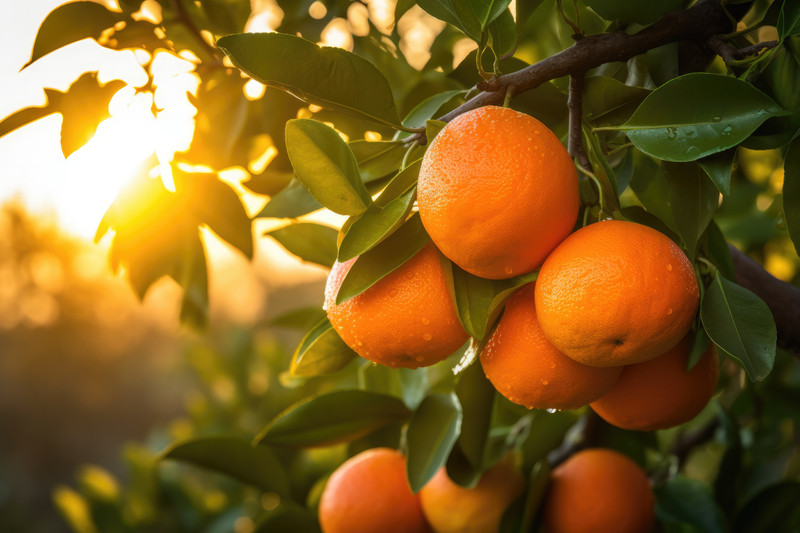Essential Oil of the Month: Clementine
Clementine (Citrus clementina)
“What is it about a (Clementine) tangerine that puts me in a happy mood?...Whenever I sniff the scent of such a small treasure I am transported in my mind to a warmer climate, where the wind whispers foreign tales in your ears and tells you where it’s been.”
- Cheri Mort
The sweet, cheerful, delightful scent of Clementine – a type of tangerine, but sweeter- Clementine's lovely aroma uplifts the spirit, calms the mind and elevates moods. And its sweet, gentle fragrance can inspire sensual moods, as it has aphrodisiac properties.
Clementine (Citrus × clementina) is a tangor, a citrus fruit hybrid between a willowleaf mandarin orange (C. × deliciosa) and a sweet orange (C. × sinensis). Named after Brother Clément Rodier, a French missionary who ran an orphanage in Misserghin, Algeria during the late 19th century and propagated and grew the very first clementines in their garden.
In ancient times, Clementines were referred to as the “crown jewel” of the mandarin family.
Clementines are quite unique among citrus plants. Specifically, Citrus clementina are able to be grown in areas with more moderate temperatures. Though the regions with higher average temperatures, such as North Africa, the Mediterranean, and California do produce the most prized clementines (in both size and quality), the greatest producer overall is China. In the United States, they are cultivated in Florida, California, Arizona, and Texas.


Though some citrus oils are extracted by traditional steam distillation, most, including Clementine, are cold pressed from the peel. The peel holds the essential oil pockets (like when you twist a lemon zest). When it is pressed it results in a watery emulsion and is then centrifuged to separate the essential oil from the water.
Clementine tangerines are at their peak during the winter months and are often used in holiday celebrations. Their sweet, tangy fragrance may evoke happy memories of merry festivities, family gatherings, food and fun. They were traditionally used during this time to bring happiness, remind us of warmer days to come with their sunny scent and thought to represent good luck.
Many winter solstice celebrations use citrus fruits like Clementines to symbolize the sun looking forward to warmer days.
During the Great Depression Clementines – or tangerines - were used as stocking stuffers and considered a treat during those challenging times. Clementine tangerines were seen as a luxury present that provided vital nutrients such as Vitamin A, C and potassium, as well as other nutrients, including zinc, manganese, folate, and B vitamin, during the bleak winter season.
The practice of placing a Clementine, tangerine or orange in a Christmas stocking is said to have originated from a legend about the generosity of the Bishop of Myra – the true Saint Nicholas - when he is said to have sent gold balls down a chimney and into the stockings of three poor young women to bolster their dowry and save them from being sold into slavery. From this legend Clementine tangerines continue to be a symbol of gold and charity.
In Asian cultures leaving Clementine Tangerines with the leaves intact on New Year's Day symbolizes long-lasting relationships.
Psychological and Spiritual Uses
Clementine is cheerful yet calming and may help connect to one’s inner child. Its playful and cheerful nature reflects a youthful zest for life.
Clementine can also represent energy, enthusiasm, and creativity. In color psychology, tangerine's warm tones evoke feelings of happiness, optimism, and stimulation.
It is believed that Clementine essential oil helps to open the heart, enlivens the spirit and energizes the spirit, yet has a relaxing effect as well.
Ancient folk recipes tell that tangerine essential oil boosts optimism, natural charm and self-confidence, restores aura after serious illness or emotional stress and is recommended when in need of spiritual warmth. It was also used to attract love by giving it as a gift.
Useful for skin: Clementine Essential Oil, like all citrus fruit oils, is rich in Vitamin C which assists skin's structure. It also includes flavonoids, powerful antioxidants that promote a reduced appearance of wrinkles and is rich in Folic Acid which hydrates and supports skin.

Psychological and Spiritual Uses
Clementine is cheerful yet calming and may help connect to one’s inner child. Its playful and cheerful nature reflects a youthful zest for life.
Clementine can also represent energy, enthusiasm, and creativity. In color psychology, tangerine's warm tones evoke feelings of happiness, optimism, and stimulation.
It is believed that Clementine essential oil helps to open the heart, enlivens the spirit and energizes the spirit, yet has a relaxing effect as well.
Ancient folk recipes tell that tangerine essential oil boosts optimism, natural charm and self-confidence, restores aura after serious illness or emotional stress and is recommended when in need of spiritual warmth. It was also used to attract love by giving it as a gift.
Useful for skin:
Useful for skin:
Clementine Essential Oil, like all citrus fruit oils, is rich in Vitamin C which assists skin's structure. It also includes flavonoids, powerful antioxidants that promote a reduced appearance of wrinkles and is rich in Folic Acid which hydrates and supports skin.
How to Use Clementine Essential Oil:
- For a cheerful yet serene scent to keep your home vibrant and peaceful, especially during holiday celebrations, diffuse 3 or 4 drops in a diffuser. A drop of vanilla may add a creamy note, or cinnamon to add a zesty note.
- Add one drop to your facial cleanser, body lotion or shampoo.
- Similar to orange essential oil which is often used in cleaning products, try adding two or three drops of Clementine to your home cleaning routine. It will add a refreshing scent to your home environment.
- For a calming massage oil, combine Clementine essential oil with lavender essential oil in a carrier oil such as sweet almond or jojoba. A drop of Ylang ylang can add a sweet calming note.
- For a sensual massage, try Clementine essential oil with vanilla, jasmine, or sandalwood essential oil in a carrier oil such as sweet almond or jojoba. A drop of Ylang ylang can round out the scent and add to the sensual feeling.
PRECAUTIONS: Though Clementine is generally considered safe, as with all citrus oils, it issuggested to avoid exposure to the sun after application to the skin. Dilute well before using. For external use only. May cause skin irritation in some individuals; a skin test is recommended prior to use. Contact with eyes should be avoided.





